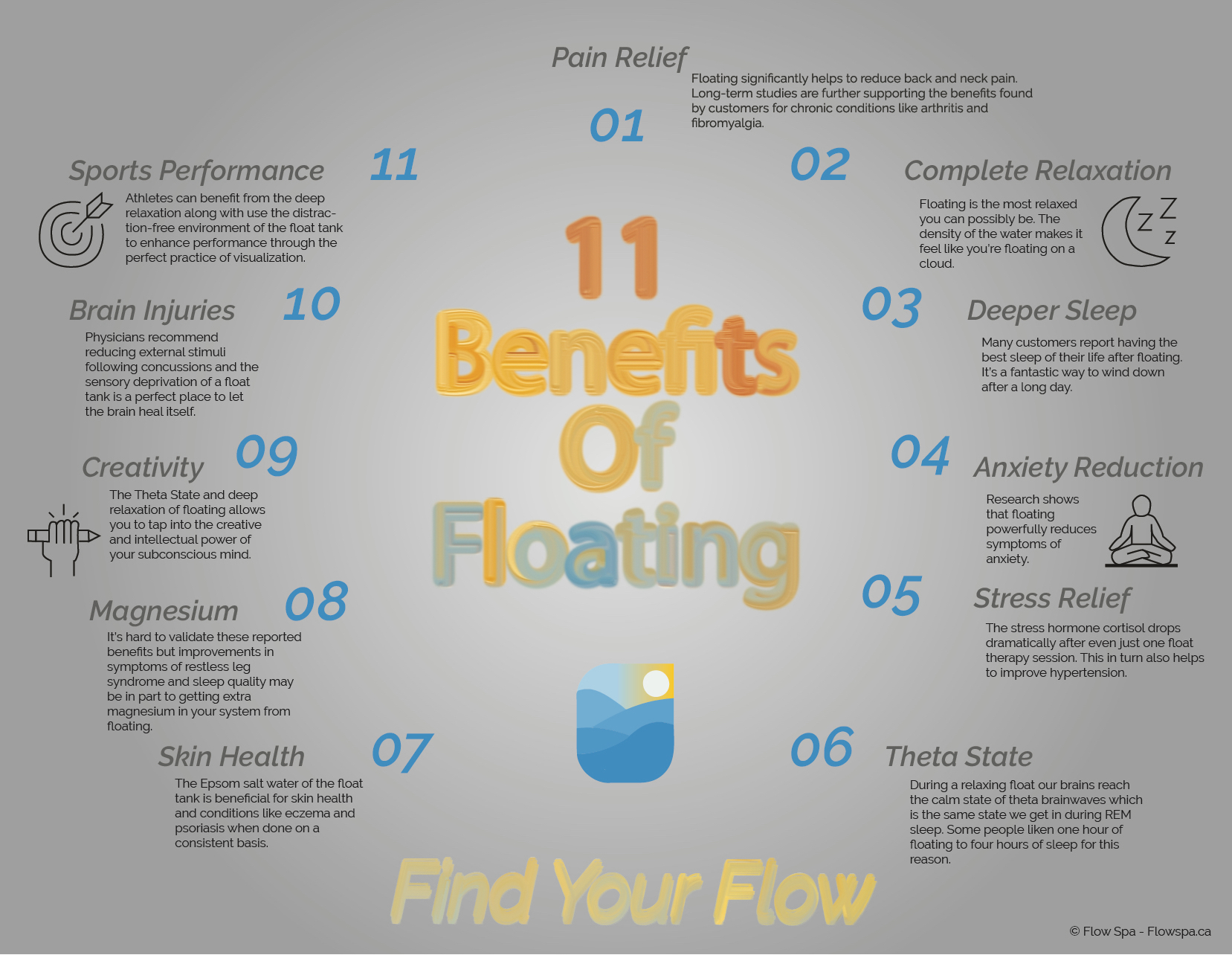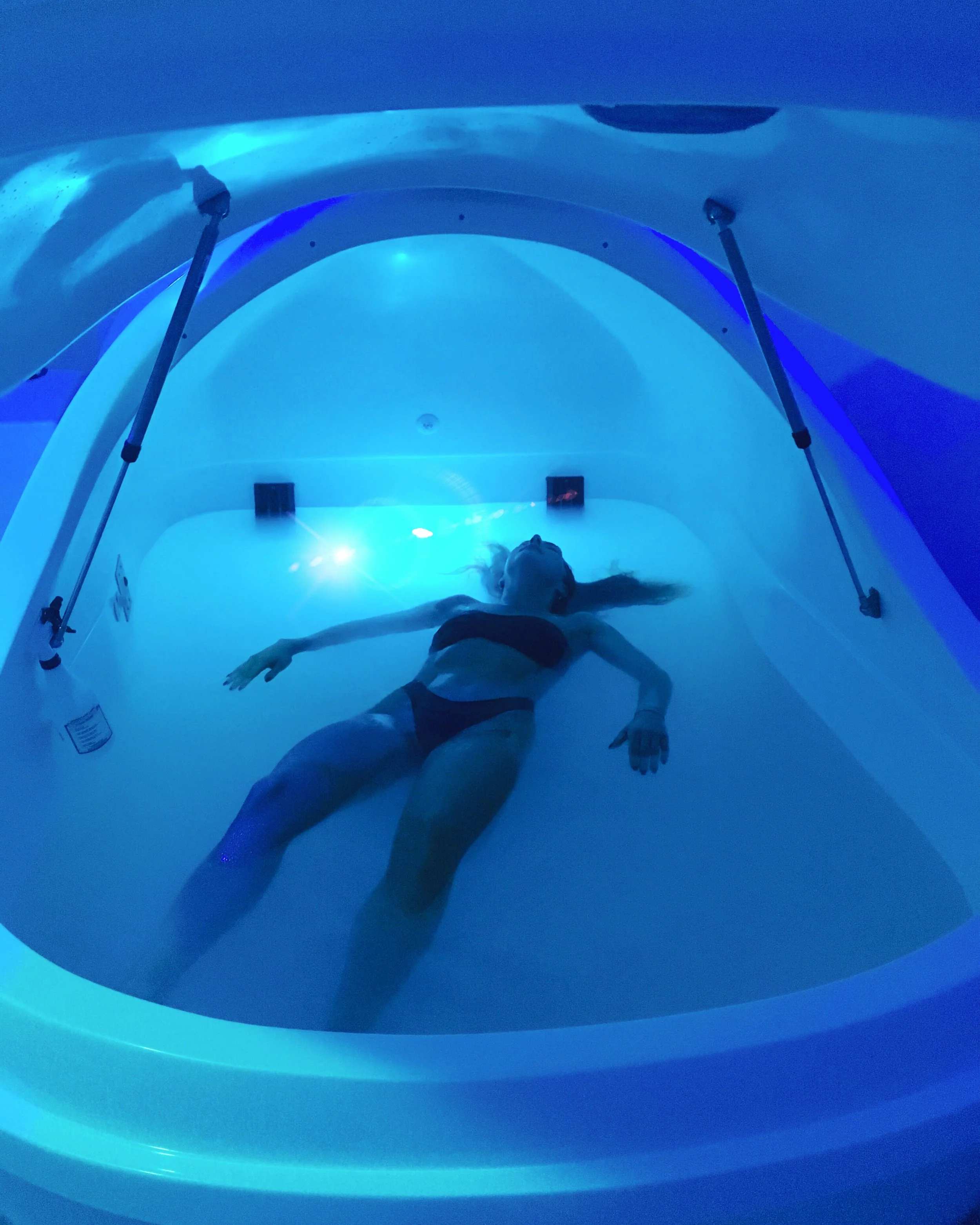Top Eleven Health Benefits of Float Therapy
Floating will make your life better. This incredibly therapeutic saltwater float experience has clinical evidence to back up a whole host of benefits. Here are 11 of the most common benefits supported by research and our own customer experiences when you come in for a Flow Spa float.
11 Ways Floating Makes Your Life Better
Jump to a Section:
Floating will make your life better. This incredibly therapeutic saltwater Flow Spa float experience has clinical evidence to back up a whole host of benefits.
Floating, float therapy, or REST (Restricted Environmental Stimulus Therapy), used to be called sensory deprivation tanks but the name has become a misnomer as improvements to the technology allows these spacious pods and cabins to be as comfortable as you want it to be. Customizations include leaving music, guided meditations, and relaxing lights on to help you get the most out your experience. Inside each of our pods and cabins are over 1,000 pounds of Epsom Salt dissolved into a solution at a depth of 11 inches. This makes the water denser than the Dead Sea allowing you to float effortlessly on the surface of the water.
Each person has their own unique experience with floating because it’s such a gentle therapy, the healing potential will benefit whatever is in most dire need of attention.
Here are 11 of the most common benefits supported by research and our own customer experiences when you come in for a Flow Spa float.
1. Pain Relief
Research supports the pain-relieving benefits of float therapy for chronic pains like neck and back pain. Because your entire body is gently supported in the Epsom salt solution, floating promotes better spine health by allowing the spine to decompress and all the tense muscles that don’t normally get a chance to relax - including during sleep - can reduce tension completely over time.
Other chronic conditions like fibromyalgia, ankylosing spondylitis, and arthritis have shown great promise in the customers we’ve had come in and long-term studies that are underway to gather further support for this beneficial effect of floating.
2. Complete Relaxation
Describing floating is challenging - it’s something you’ve got to see and experience to fully understand because it’s a completely new experience and sensation. One term that does get through most often in describing floating is that it is a complete and unrivalled relaxation experience. This type of stimulus reduction and peace sets the entire body and mind at ease in a way that’s hard to compare to anything else. The temperature of the water is the same as your body and most people liken it to feeling more like floating on a cloud rather than being in water
3. Deeper Sleep
Many people report having the best sleep of their life after floating. This is why it’s popular to float in the evening while winding down after work to allow the body to gently ease into sleep with a reduction in racing thoughts and to-do lists shuffling through your mind.
4. Anxiety Reduction
We live in a busy and distracted world and a byproduct of this is that many of us are facing greater levels of anxiety daily. Because floating is so relaxing and allows our overactive nervous systems to completely tone down for an hour, clinical evidence supports a dramatic reduction in symptoms of anxiety from float therapy. Many customers relish the feeling of leaving the spa without a care in the world about the things that usually bother them. More often than not customers will take some extra time to relax in our lounge and enjoy some tea or water after their float.
5. Stress Relief
In addition to reducing anxiety, floating busts through similar symptoms of stress. Researchers have shown a significant drop in the stress hormone cortisol after just one hour of float therapy. Having less cortisol present in your system allows you to have a clear and focused mind and to be more productive or to fully embrace the bliss of treating yourself to some well-deserved R&R.
This reduction in stress levels also contributes to a significant reduction in hypertension that comes with floating. High blood pressure is temporarily improved even after just one float session.
6. Theta State - REM Sleep
The theta brainwave state sounds like something very mystical, and sure, it can be but in essence, it is the slow and calm state our brains get into during REM sleep when we are dreaming. It is a sign that our brains are deeply relaxed and can be reached by experienced meditators as well. The cool thing is that research shows the deep state of relaxation that comes from floating induces a theta brainwave state without the need for years of practice in meditation or going completely to sleep. There are unique benefits to this including enhancing creativity, consolidating memory, and feeling refreshed without needing to completely fall asleep. While it’s not a perfect analogy, some people liken this theta brainwave activity that comes from floating as the equivalent of 4-6 hours of REM sleep. For people who sleep poorly, this can be extremely powerful when it comes to memory consolidation and recovery that sleep typically provides.
7. Skin Health
The float tank solution is nearly 30% Epsom salt which makes it supersaturated in magnesium. Magnesium is important for skin health and many customers dealing with dry skin or conditions like psoriasis and eczema report improvements in symptoms when adding floating into their routine.
8. Magnesium Deficiency
Testimonials from customers reporting that floating helps with restless leg syndrome or sleep quality (as magnesium is an important mineral for promoting deep sleep) suggests that magnesium may be boosted through floating. While it’s next to impossible for researchers to accurately support this due to differences in skin porousness and multiple possible pathways for absorption, it’s still great to know that floating seems to help with conditions often associated with magnesium deficiency.
9. Creativity
Deep relaxation and inducing the theta brainwave state has helped many artists and thinkers in a wide range of fields uncover incredible potential and ideas in their brains. Whether you go into a float with a particular problem you’re trying to tackle or it simply comes to you naturally from the depths of your subconscious, it’s undeniable that the unique environment of the float tank has produced countless fascinating works of art and ingenuity. Float centres in the U.S. have worked with various artists to put together entire music albums and art instalments produced from these artists after coming out of a float. Comedian Joe Rogan has also become a patron saint of floating as he often attributes this deep meditative state to helping him create many of his most popular bits of comedy.
10. Brain Injuries and Concussions
As if floating wasn’t good enough already, many doctors and health care practitioners working with patients dealing with brain injuries or concussions are starting to recognize the healing potential of float therapy. The typical post-concussion protocol involves having the patient spend some time each hour away from the blue light of digital devices and ideally in a quiet and dark area. Taking this a step further, the advantage of nearly-complete sensory deprivation that comes from floating provides an hour or longer free from stimuli, a significant amount of time for the brain to work its magic on healing itself.
This is an important point which has started to get the attention of athletes competing in high-contact sports and we’ve seen customers return to work after a shortened recovery period following traumatic brain injuries with the help of regular floating.
11. Sports Performance
Professional sports teams have started to take note of the potential of floating for more than just the potential to help with concussions. Athletes are highly driven and competitive and often have a hard time turning off their brains to enter a relaxed state. Floating can work wonders to allow athletes to shift into a deep state of relaxation to allow the nervous system to reset and recharge.
The very best athletes in the world also include visualization in their routine as a regular practice to perfect motor patterns for the repetitive movements involved in their sport. It sounds a bit odd at first and like magic to think that seeing yourself in your mind in action can lead to an improvement in the physical world but repeatedly this is the case in research done on a wide range of physical performances. Dry training with U.S. Olympic Swim Coach Bob Bowman’s athletes, including Michael Phelps, entails mentally rehearsing a race while timing it with a stopwatch. These world-class athletes become so myopically focused that they visualize their full race and can stop the clock within tenths of a second of their actual swim time. The sensory reduction of the float tank is the perfect place for athletes to mentally rehearse the practice of their sport to carry over to their performance in-game. Golden State Warrior’s All-Star Steph Curry floats multiple times per month to maintain crisp and perfect shooting.
Just like with any therapeutic modality, many of the great benefits of floating come with time and our customers experience better results over time as compared to just one session. While you’ll love your experience of floating even the first time, know that it gets better with each subsequent visit. A common recommended is that you try floating three times to get used to it and figure out your preferences for having the best experience.





